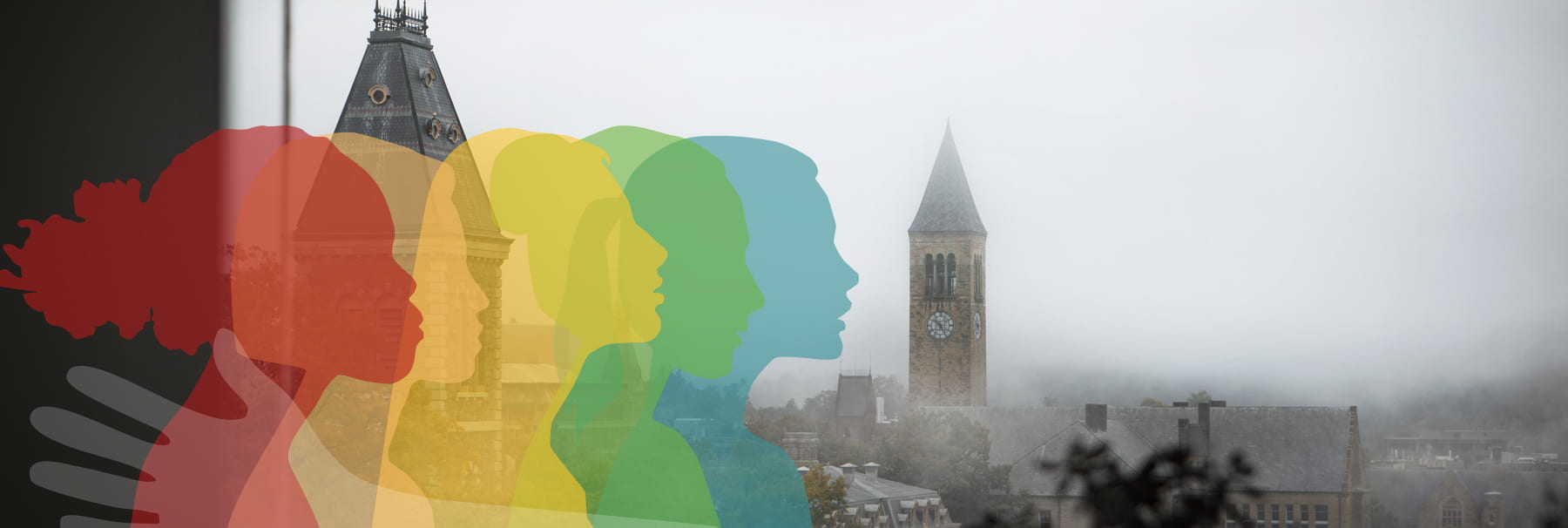
A look at the marginalization of Cornell women through the lens of sexual assault
This story was created in Dr. Jennifer Majka’s course, AEM 2015, The Business Case for Diversity & Inclusion at Cornell University, in spring 2022. The authors created a podcast series presented in an e-magazine format, and you see a recreation of their materials here. The authors discuss the history of the coining of the terms “sexual assault” and “sexual harassment,” which resulted from a case brought forward by a brave former Cornell employee and the surrounding context in 1975. Her experience, a rally of 300 people in Ithaca, and the dedicated work of Cornell faculty and staff gave us language to talk about the problem and set a precedent for legal protections. The authors also present interviews with the staff from the Title IX office on campus and the Office of Student Conduct and Community Standards, to discover the history and current roles of Cornell’s offices and policies and the support and guidance they offer. The authors invite us to engage in productive conversations about sexual assault and harassment to further the education, commitment, and support in our community.
Podcast Stories
Personal connection with the topic
Past and Recent History of Cornell’s Title IX Office
Greek Life Policies and Cornell’s Next Steps
Hi! Our names are Kayla, Christina, Adriana, & Lauren, and we are a team of students that are hoping to spark a meaningful and productive conversation about sexual harassment in Cornell Greek life. To do this, we created a three-part podcast series that explores past and present marginalization of women through sexual assault in Cornell’s Greek life settings. We sincerely hope that these clips not only provide you with significant information about sexual abuse on and off campus, but also facilitate your own discussion and thinking about this salient subject. We wanted to begin the series by introducing ourselves, providing some context about this important topic, and explaining a bit about why we were each individually drawn to this project.
Click the podcasts on the left to listen, or read the text below.
See link to Magazine Story
Podcast Transcripts
Podcast 1: Christina Gioioso
Before beginning this project, I noticed that there was a clear disparity between the frequency in which I heard about sexual assaults on campus and the frequency of productive conversations dedicated to reform. The quest to see the evolution of conversations surrounding sexual assault led me to the Cornell Daily Sun Archives, where I found that the term sexual assault was not coined until 1975, and its roots trace back to Cornell. The story of Carmita Wood was particularly eye-opening to me. Carmita Wood, an administrative assistant on campus who was sexually harassed by physicist Boyce McDaniel for years before finally resigning. Ms. Wood was not given any unemployment pay because her reason for quitting was for “personal reasons,” completely disregarding the unwanted sexual advances she had suffered for years. The reason Ms. Wood was not taken seriously was because there was no term for the type of unwanted sexual advances that she was experiencing. Sexual harassment, despite it happening for years, did not exist because there was no term for it. The story of Ms. Wood led to a rally with more than 300 women in the Ithaca area sharing their stories of sexual harassment in the workplace, and it made national headlines. Lin Farley, who was teaching at Cornell at the time, heard of Carmita’s story and worked with colleagues to develop the term sexual harassment, a phrase that validated the experiences of decades worth of women. The story of Carmita showed me the power of the language that we use to validate people’s experiences, and my hope is that this project will help shed light on the issue of sexual assault on Cornell’s campus.
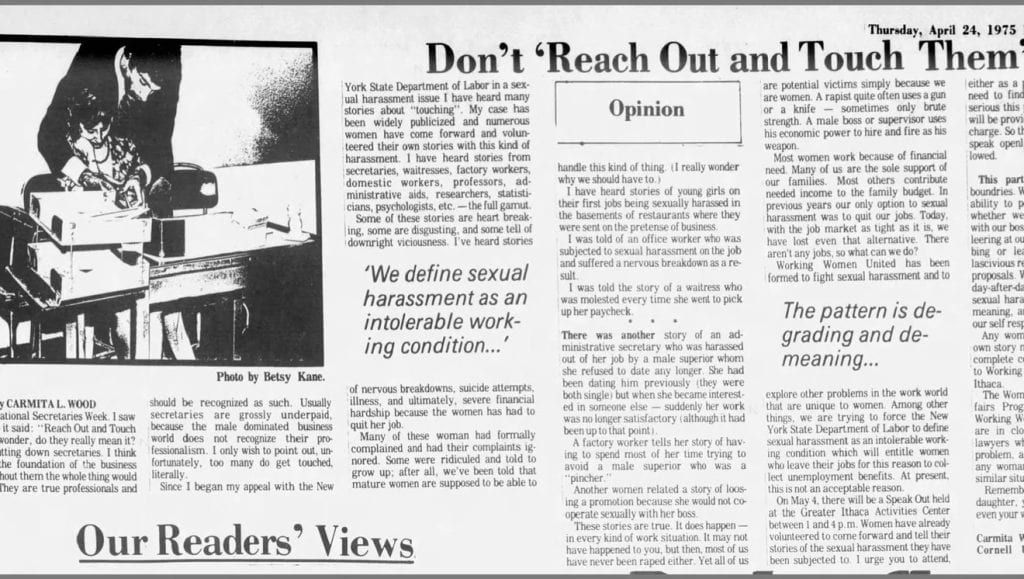
The story of Carmita showed me the power of the language that we use to validate people’s experiences, and my hope is that this project will help shed light on the issue of sexual assault on Cornell’s campus.
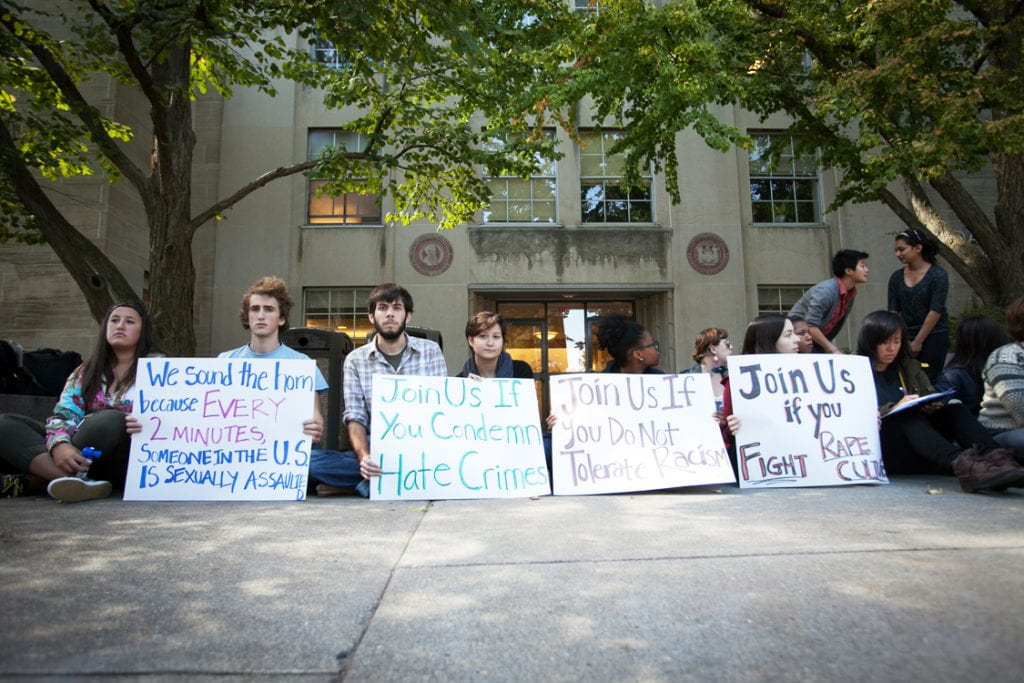
My main goal upon completing this project is to spread awareness and have Cornell administration hear our fight to finally change the sexual assault statistics on campus to create a better environment for students to grow and flourish in their studies, as well as have access to a safe social life.
Podcast 1: Kayla Riggs
To be completely candid, I had been fairly naive about sexual assault and its prevalence in environments I occupy before attending Cornell. Though I knew sexual assault and harassment were serious issues that impact innumerable people on a daily basis, I had maintained the ideology that I and my friends were invincible to its effects—that, essentially, it wouldn’t happen to us. However, having been in college for nearly two years now, I know more people than not who’ve experienced instances of sexual harassment throughout their time at this school. Knowing this, I want to do everything in my power to help fix this culture—and that is why I was drawn to this project. I think it’s important to speak more openly about Cornell’s past and present history of sexual assault because, unfortunately, it is more extensive than one might originally think. It is my hope that we can begin to have productive conservations about sexual assault at Cornell more frequently, giving us the tools to hold our university—and institutions within it, like Greek life—more accountable for their actions, hopefully contributing to an overall change in culture on campus. A recent Cornell Daily Sun article truly opened my eyes to sexual assault in Greek life settings on campus and prompted a meaningful conversation within my friend group about this issue. The piece discussed the current rape culture that is prominent in Cornell fraternities, which is our main focus for this project. I specifically wanted to draw attention to one particular line within the story: “Ask anyone that’s ever been to a frat party or a date night and they will describe the uneven male to female ratios, the creepy grabbiness of men on dance floors, the pressure to hook-up with dates or the drinking that blurs lines of consent.” Personally, I thought that this was an unfortunate—yet pivotal—observation to pinpoint because it gets at the tragic reality that nearly every Cornellian has had an experience of sexual abuse in a Greek life environment during their time at this university. This quote also particularly stood out to me because it also suggests how normalized sexual abuse is on campus; in my experience and that of the writer, something like non-consensual touching on a fraternity dance floor is often dismissed as “people having fun” or “someone being a bit too drunk,” rather than as a serious issue we must acknowledge. Put simply, all of these things should not be the case; I hope that, by shedding light on this unfortunate truth, we can recognize that sexual assault is a widespread issue that must be addressed with more rigor and attention moving forward. By understanding that a problem is present, we can transition to preventative measures that can perhaps start to remedy a cycle of abuse at this school.
Podcast 1: Adriana Marti Dafcik
The reason why I found this topic to be so important and interesting to address was because, back in December, I enrolled in Cornell as an exchange student and I started receiving almost daily emails from Cornell Alert about sexual harassment incidents. Honestly, I was quite afraid about the magnitude of these events as well as their brutality. At first sight, I felt surprised by the fact that these terrible things could happen in a leading educational institution such as Cornell. Since then, I told myself that once arriving at Cornell I would help in any way I could to try to solve it or, at least provide support somehow. That is why after receiving all the emails mentioned before, I started reading and asking students about what exactly was going on to understand why these incidents were happening. After thorough research, I found out that Greek life was one of the main causes. In fact, what resonated with me the most was the data and figures I found at the Cornell Sun’s biannual survey that Kayla mentioned before. There were alarming rates of sexual misconduct at Cornell. Just to give you some figures, 68.2% of undergraduate women and 51.3% of undergraduate men reported experiencing some form of sexual or gender-based harassment, and, in 2019, 22.6% of undergraduate women responded that a fraternity house was the setting of their most serious incident of sexual violence. The positive part of the 2019 survey was that incidents decreased from 2017 to 2019. However, the proportional percentage of Greek life has not changed, which means that there is still a lot to do in terms of how to address sexual harassment incidents in frats and sorority events. As my colleagues mentioned above, spreading awareness and talking about the issue might help in the short-term to make people conscious about it. However, this is not enough. We all know that sexual assault is a worldwide issue and that to minimize the risks of it, it is highly necessary to offer long-term and sustainable solutions. I hope that through this project we can not only spread understanding about the problem, but also educate students about the different initiatives.
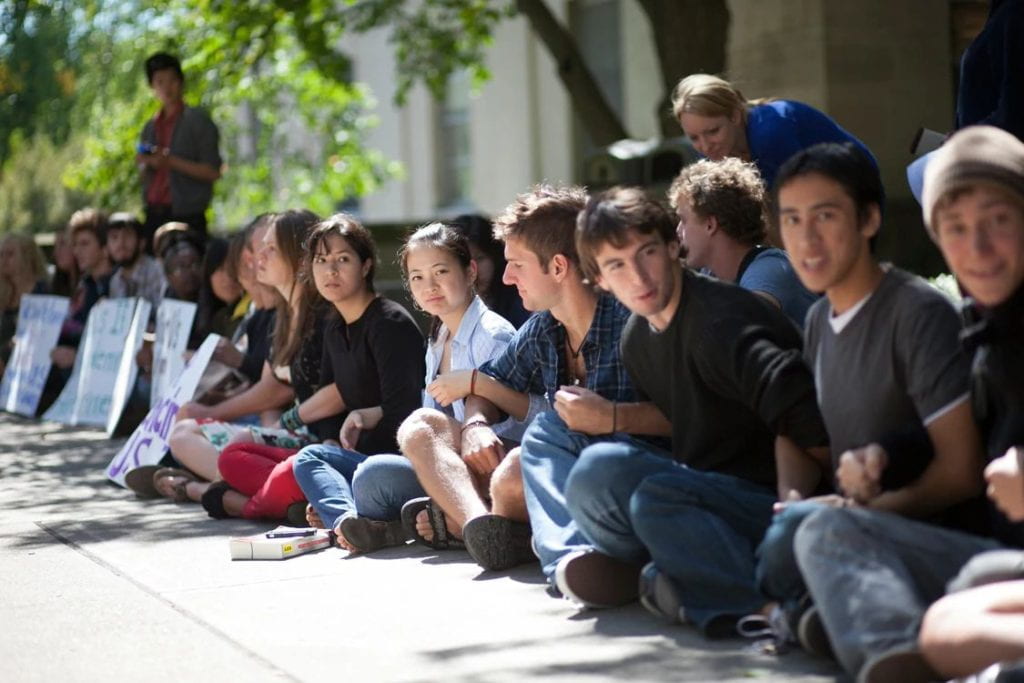
We all know that sexual assault is a worldwide issue and that to minimize the risks of it, it is highly necessary to offer long-term and sustainable solutions.
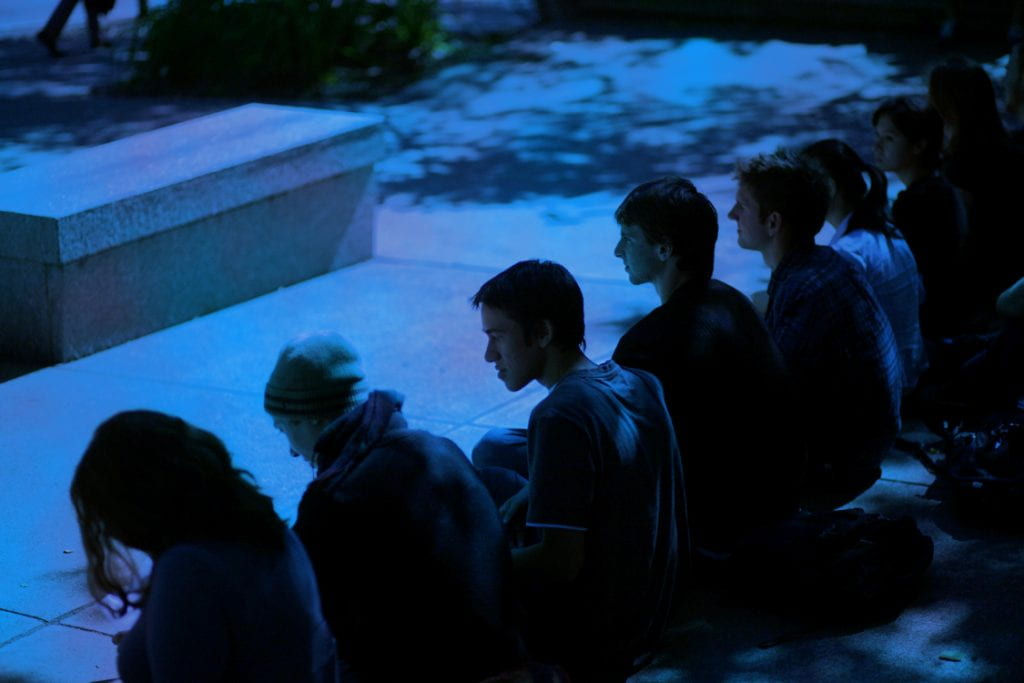
Though I knew sexual assault and harassment were serious issues that impact innumerable people on a daily basis, I had maintained the ideology that I and my friends were invincible to its effects—that, essentially, it wouldn’t happen to us.
Podcast 1: Lauren Reeves
This topic is so important to me because I’m currently in the process of being a part of Greek life and find it horrifying the experiences some people go through. Sexual assault is a serious issue found on Cornell’s campus that needs to be taken seriously by staff, students, and all of Greek life participants. My main goal upon completing this project is to spread awareness and have Cornell administration hear our fight to finally change the sexual assault statistics on campus to create a better environment for students to grow and flourish in their studies, as well as have access to a safe social life. I was very shocked and horrified by the results we uncovered while doing this project. Many cases involving Greek life and sexual assault have been swept under a rug. The culture associated with Greek life needs to be reformed and changed to better the experience for all involved, I also feel Cornell should be taking sexual assault issues more seriously and cracking down with harsher punishments if fraternities are associated with them. In the past fraternities have received slaps on the wrist for issues that resulted in sexual assault or even hazing, which clearly have not impacted how these fraternities run. One article that stood out to me was published in the Cornell Daily Sun. The article “Guest Room” discusses the horrors associated with Greek life and the different fraternities and sororities involved. Cornell has made headlines multiple times for the cruelty revolving around our Greek life nature. One quote in particular that stood out to me to the most was, “One in four men in fraternities are 300 percent more likely to sexually assault someone than other college men. The figure is just as harrowing for women in sororities, who are 74 percent more likely to experience rape than other college women.” These statistics need to be changed immediately to make Cornell campus a safer place for everyone who attends.
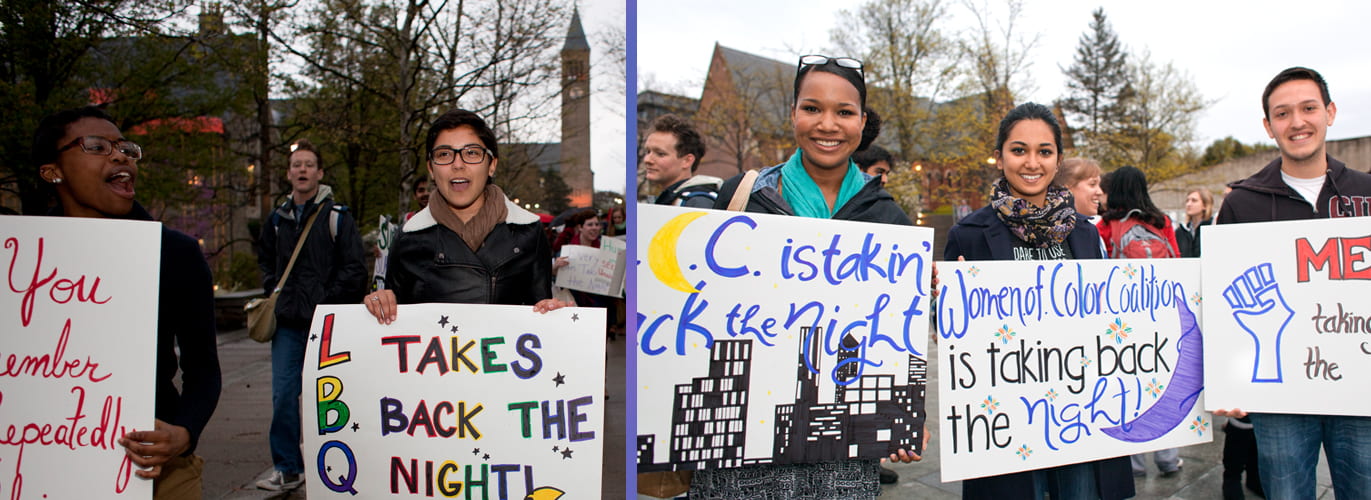
Campus Event
A Take Back the Night march sponsored by Women in Public Policy (WIPP).
Credit: Robert Barker, Cornell University
Podcast 2: Past and Recent History of Cornell’s Title IX Office
We sat down with Lauren Branchini, the University Title IX Coordinator, to learn a bit more about Title IX policies on Cornell’s campus.
What is Cornell’s Title IX Office and when was it created? According to Lauren, the IX office was created in 2016 and is part of the institutional equity offices inside Human Resources.
Lauren told us that the office primarily works to address issues of bias, discrimination, and harassment that occur on campus. The office receives important disclosures of sexual involvements and then analyze the type of violation. Apart from that, they also collect data. In fact, the make a biennial survey published in Cornell Sun where they show the results that student reveal about sexual assault and harassment experiences.
What type of support/resources does the office offer?
One of the main supports that the office offers is to reach out to the person affected, and it gives information about the right person to contact, which are the resources that Cornell can offer, where the Women’s Resource Center is and in general, how to access these places or resources. When someone reports an incident, a formal complaint process should be started. However, Lauren told us that usually reports don’t result in formal complaints, because the person wants to remain anonymous and prefers not to say the name to the university.
What are the main challenges you are faced with? Do you think there is a sexual assault/harassment problem within Greek life at Cornell?
She stated that the main problem they have is that a lot of incidents are not being reported. She knows this as the rate of incidents and the rate of reporting does not match in the survey and, in fact, the gap in Greek Life is much bigger. The problem is that the office IX only tackles issues that happen on campus, whereas a lot of incidents are happening off-campus.
What do you think are the primary flaws in Cornell’s handling of sexual assault? What do you think can be improved?
The first reason she mentioned is the importance of educating individuals to be sensitive about the different issues. One example is the module that all Cornellians have to complete about sexual assaults before starting their classes in Cornell. By doing this, the institution can spread awareness and can explain many strategies on how to behave regarding this topic. They are currently working on different projects across different departments to try to reach out and spread awareness even more.
Secondly, another problem she has seen is the fact that many victims do not talk about the problem, aka do not report anything due to confidentiality. Individuals are afraid of speaking about it because they think they will have a bad social reputation.The Title IX has to make a big effort in offering confidential support so that people actually trust them and can talk and report the incidents.
Finally, the main issues she mentioned is the fact that there is a lot of employee rotation within the Title IX department, due to the lack of financial support/resources that Cornell offers them. There is a high turnover which is 18-month on average. Consequently, many long-term projects are not being finished or transferred to different people all the time, which reduces the effectiveness and performance of them. Having said that, Cornell has to try to retain talented people and pay their employees to be able to solve this issue in the long-term.
That concludes the second podcast in our three-part series. Stay tuned for our final podcast, which explores past and present Greek life policy regarding sexual harassment and discusses Cornell’s next steps in addressing this issue.
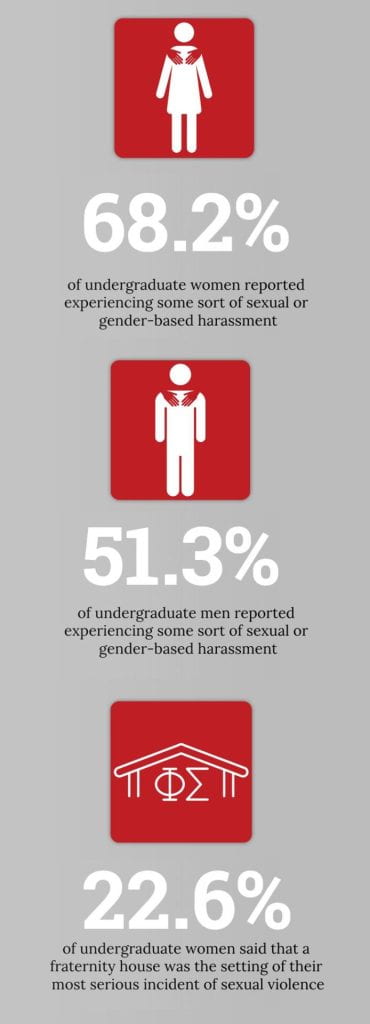

Podcast 3: Greek Life Policies and Cornell’s Next Steps
What is the protocol for investigating/reporting a sexual assault or harassment case?
Christina and Christine explained to us that there are three major players relating to sexual assault and harassment cases: the Title IX Office, the Cornell Police Department, and their office, the Office of Student Conduct and Community Standards.
They noted that sexual assault and harassment fall under University Policy 6.4, which “means to address bias, discrimination, harassment, and sexual and related misconduct,” according to the Title IX Office; harassment that is not sexual in nature, however, falls under the university’s Code of Conduct and, subsequently, OSCCS. According to Christina and Christine, harassment must be ongoing, pervasive, unwanted, threatening, or humiliating. OSCCS was formerly known as the Office of Judicial Administration. This office was renamed in Fall 2021 (after 50 years of being called the JA Office) to remove any parallels between this office and the criminal justice system. The goal is that the new name, policies, and procedures in place will steer the office away from being a place where students just “get in trouble.” Instead, Christine and Christina hope that this office can facilitate meaningful and productive conversations between parties.
Ultimately, by making this office more approachable and less punitive, they hope to give the power to victims and encourage reporting of harassment/assault.
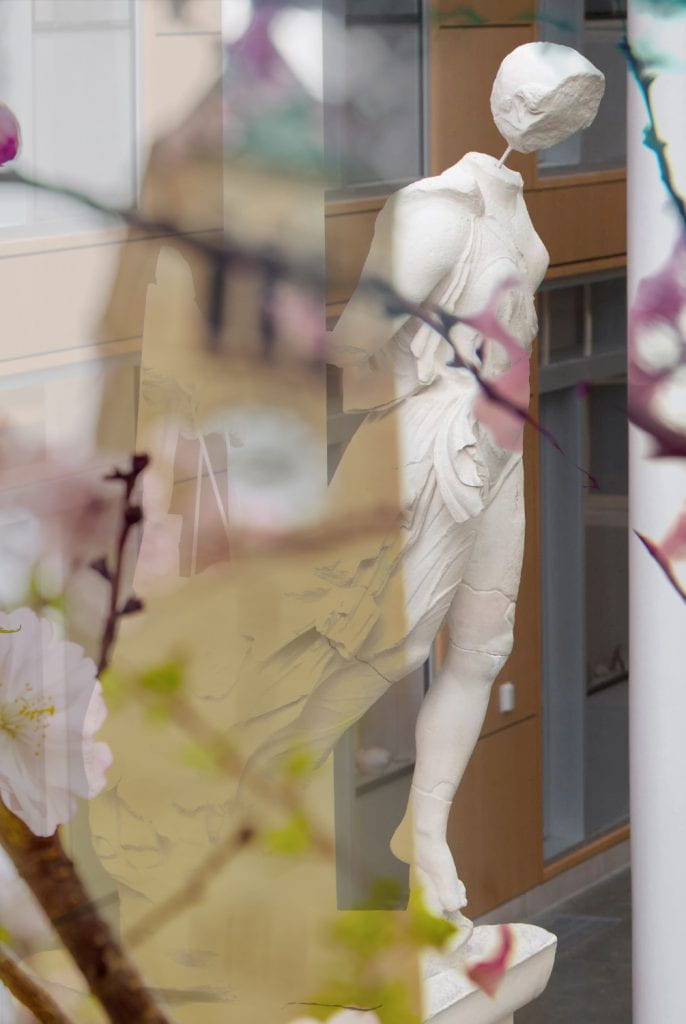
What policies are in place? Is it a zero tolerance policy?
Christina explained that it is virtually impossible to implement a zero tolerance policy when it comes to incidents of harassment because each of these cases is simply too complicated. Thus, the office focuses on fact-specific investigations that are taken on a case-by-case basis. To the best of their ability, they try to remove individual violations from the organizations that they are part of, such as Greek life. The pair explained that it is hard to trace individual behavior back to one organization when Cornell students are so heavily involved in groups on and off campus. Because of this, the office looks closely to identify patterns in reported incidents; when these sequences emerge, Christine and Christina start to look at the organizational level of a reported violation and potentially suspend the appropriate organization.
Have you noticed any recent trends in sexual assault/harassment cases since the office has changed names?
Since the name change of OSCCS was so recent, there is not any concrete data relating to changes in instances or reportings of sexual assault. That being said, Christina and Christine did note that the change in name as well as the updated Code of Conduct gives the OSCCS more room to handle these situations. For example, while they previously did not handle whether an organization like a sorority or fraternity is considered an official organization, they are now able to distinguish this, which allows them to further examine the relationship between individuals and the organizations they are a part of. The scope of their work has expanded, and as a result they have new tools to handle reports of sexual assault/harassment. Ultimately, they have noticed that, since they removed the parallels to the judicial system, there is less of an immediate anxiety response when the OSCCS is involved, causing students to be more willing to interact with their office.
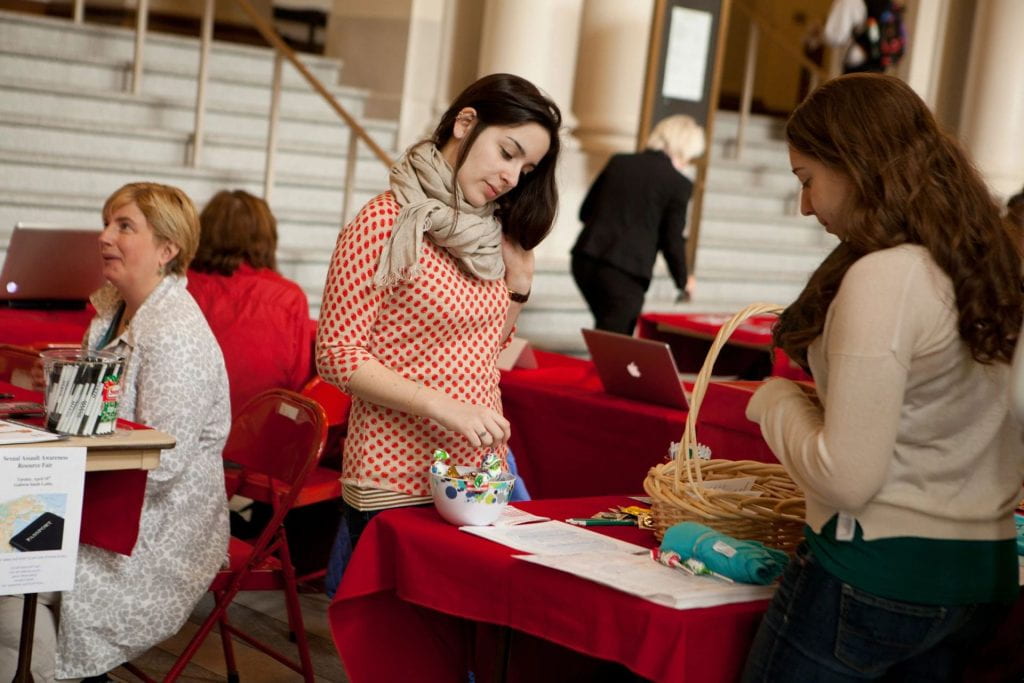
Credit: Lindsay France, Cornell University
What are your goals for future policy?
Since this is the first year of the new office name, Christine and Christina noted that there is plenty of room for improvement. Moving forward, they hope to assess current resources available by looking at factors such as how long it takes cases to be resolved and how many students choose a particular option when given next steps. By looking at these trends, they hope to expand the scope of their training to include more students in executive positions (club/Greek life e-boards, Resident Advisors). They also hope to implement bystander intervention training. The OSCCS has noticed a lot of overlap between their office and other administrative offices. Thus, they also hope to streamline their policies and procedures as well as work on collaboration between these offices with the ultimate goal of helping victims.
What challenges do you face?
One challenge that Christina and Christine noted is that the only way to make lasting change on campus is through students’ commitment to change the culture on campus. For example, at Indiana University, the Panhellenic community boycotted fraternities until their voices were heard. While Christina and Christine do not advocate for cancel culture, they used this as an example to show that when students band together, genuine change can be made. The OSCCS can only provide so much training regarding harassment; at some point, it is up to us as students to enact change. People on the ground (i.e. students) have the ability to intervene much more than any administrators do—it is our responsibility to do so. Once we begin to stand up for little injustices, the tolerance for larger injustices is lowered, and therefore we create a safer campus.
Members of the Cornell Community may consult with the Victim Advocate by calling 607-255-1212, and with Cornell Health by calling 607-255-5155 (24/7). In case of immediate concern, call 911 or contact Cornell University Police at 607-255-1111 (24/7). Faculty and staff may call the Faculty and Staff Assistance Program at (607) 255-2673 for support and referrals. Other resources for information and support about sexual harassment, assault, gender discrimination and other related forms of violence are available at Cornell’s Sexual Harassment and Assault – Response and Education (“SHARE”) website. An Ithaca-based Crisis line is also available at 607-272-1616(24/7). The Tompkins County-based Advocacy Center is available at 607-277-5000 (24/7).
Notes
Campbell, Jessica. “The First Brave Woman Who Alleged ‘Sexual Harassment’.” Legacy.com, July 31, 2020. https://www.legacy.com/news/culture-and-history/the-first-brave-woman-who-alleged-sexual-harassment/.
Mearhoff, Sarah. “#MeToo: Fight against workplace sexual harassment began at Cornell in 1975.”The Ithaca Journal, February 21, 2018. https://www.ithacajournal.com/story/news/local/2018/02/21/metoo-fight-against-workplace-sexual-harassment-began-cornell-1975/347388002/.
Giufurta, Alec. “Survey Finds ‘Alarming’ Rates of Sexual Misconduct at Cornell as Leaders Struggle for Solutions.” The Cornell Daily Sun, October 20, 2019. https://cornellsun.com/2019/10/20/survey-finds-alarming-rates-of-sexual-misconduct-at-cornell-as-leaders-struggle-for-solutions/.
Cornelia. “SEX ON THURSDAY | Narcissism and Rape Culture in Cornell’s Fraternities.” The Cornell Daily Sun, November 12, 2020. https://cornellsun.com/2020/11/12/sex-on-thursday-narcissism-and-rape-culture-in-cornells-fraternities/.
Huang, Catherine. “GUEST ROOM | To Cornell: Don’t Make Promises You Can’t Keep.” The Cornell Daily Sun, December 15, 2020. https://cornellsun.com/2020/12/15/guest-room-to-cornell-dont-make-promises-you-can’t-keep/.
